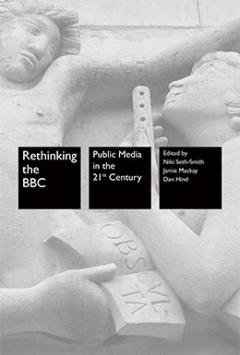
OpenDemocracy’s new book, Rethinking the BBC: Public Media in the 21st Century, brings together industry insiders, outsiders, academics, activists and cultural figures to propose how the BBC can meet the challenges of the next decade.
Read it for free here.
***
In the next few years, the UK’s constitution will be re-shaped. As a nation, we are yet to recognise the enormity of this. It’s exciting - and terrifying. And this includes the BBC. Why? Not only because it is the single most important media operation in the country, but because it belongs to the peoples of these islands and is part of our informal constitution.
Yet the debate about the BBC is in a bizarre place, post-referendum. On the one hand, there are calls to protect this key component of British soft power. While our academic prowess falters - Cambridge has just dropped out of the top three universities for the first time since rankings began - our cultural production must remain world-class. On the other extreme, there’s the shock doctrine approach- the Centre for Policy Studies chose a good time to pounce with their recent attack-report. Yet they’re right to say that the case for “radical changes to the BBC” to make it “much smaller … will become even more compelling over the next few years”. Whatever your post-Brexit economic analysis, the decade until 2027 - when the Charter now being drawn up will run out - will not be one of overflowing public coffers.
But behind the tug of war over funding and delivery of value, there is a deeper question: does the BBC still serve the public? If Britain is truly a divided nation, Auntie’s role as consensus-maker becomes unworkable - or even, dare we say it, unwanted.
Into this space we publish Rethinking the BBC: Public Media in the 21st Century, bringing together industry insiders and outsiders, cultural figures, academics and activists, to not only provide fresh analyses, but concrete proposals towards a BBC fit for the future. It draws on more than three years of debate and argument at openDemocracy’s OurBeeb project and there is no cosy consensus about how the corporation should be reformed.
Thus we have Nick Fraser, editor of BBC Storyville, calling for a revamp of the “egalitarian poetry of self-enlightenment”, dramatist Peter Jukes proposing a cure for ‘Breaking Bad Blues’ and science fiction writer Cory Doctorow advocating that we open up the archives. Ideas for innovation from established figures at the Corporation come alongside voices such as Sarah O’Connor’s on coming from a working class background into the BBC bubble, or Chimene Suleyman on the need to break away from minority group cliches.
If it’s surprising to read David Elstein, openDemocracy’s Chairman and the chief exec who launched Channel 5, and communist activist and journalist Aaron Bastani, both arguing for sharing the licence fee, then we’ve done our job. It has been fascinating editing ‘Rethinking the BBC…’ for many reasons, but ultimately due to the discovery of how these diverse voices, from Peter Hitchens to Becky Hogge, Phillip Pullman to Aaqil Ahmed, can be read as pushing in the same direction.
What they share is a concern about the future of the BBC, as part of the future of the nation. And they don’t see the Charter now being drawn up as taking this challenge seriously. What will Britain look like in 2027? The United Kingdom (if it exists in its present form) will have transformed its relationship with Europe and the world - we will have been forced to confront the challenges of the fourth industrial revolution, as well as climate change and new forms of conflict. The Brexit referendum showed us our capacity for division when meeting the big issues of our age, and the media’s hungry complicity in this. For all its weaknesses, the BBC has stood in the way of a US-style media landscape that has institutionalised this hunger.
Yet the authors collected here are not complacent defenders. They ask what successful public media in the 21st century will look like, and present workable ideas. So economist Mariana Mazzucato and Cian O’Donovan propose a new framework for judging PSB success; Meirion Jones, who led the original (pulled) Newsnight investigation into Jimmy Savile’s abuse, sets out a detailed plan for a BBC investigations unit; Brian Eno proposes a controversial new programme to be named ‘What Actually Happened’. Many go so far as to suggest that the BBC will not recognisably survive without strengthening its claim to belong to the British public. Some see other public service broadcasters, and in some instances the market, as more able to deliver the public service content Britain needs.
The Conservative government is committed to its vision of the BBC. It wants a corporation that runs alongside, rather than challenges, the market logic of private media. It wants a BBC that doesn’t cause too much trouble - paying tribute to diversity, while continuing to produce a central consensus that sets a standard on which voices, and opinions, to exclude.
Read this book, and you will see that many other kinds of BBC are possible. Far from wishful thinking, fresh ideas are urgently needed. If the corporation is to survive the transformations of the next decade, drawing on them may, sooner or later, prove inevitable.
Read more
Get our weekly email

Comments
We encourage anyone to comment, please consult the oD commenting guidelines if you have any questions.